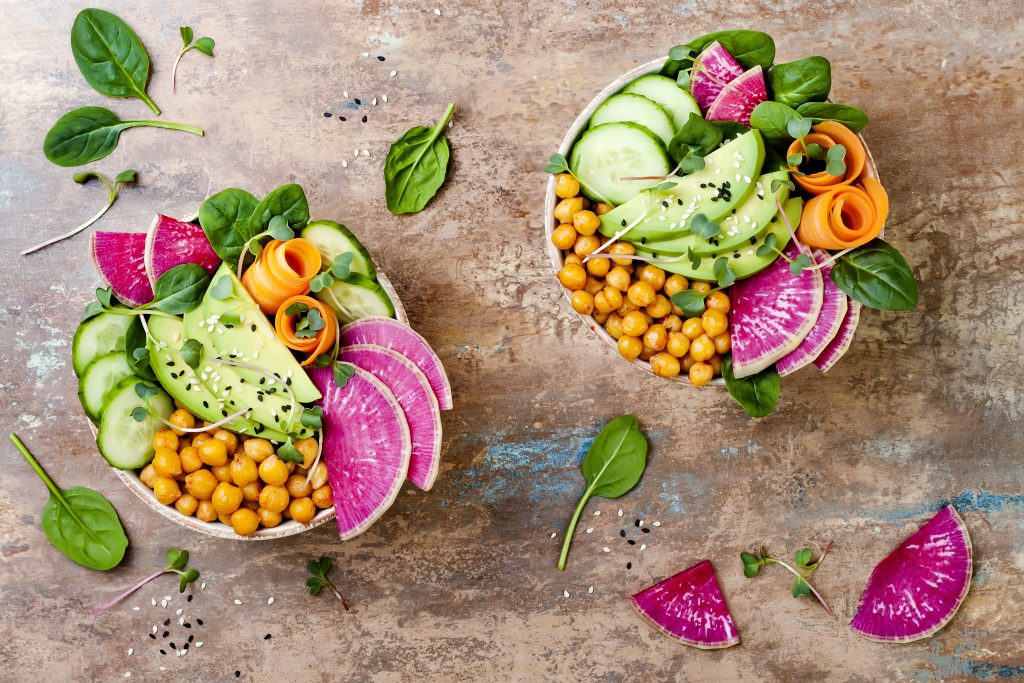Whether its the impact on the environment or concern for animal welfare, more and more people are going vegan. But a vegan diet still has a bad rap in terms of fitness. Is it really suboptimal to your fitness goals to go vegan? We look at vegan nutrition for fitness, and how to optimise your vegan diet to make sure you still hit your goals.
Vegan Nutrition for Fitness – Why the Bad Rap?
Many think that going vegan will compromise your fitness goals. This is largely down to the fact that vegan diets typically do not contain as much protein. Vegan diets can also be deficient in certain vitamins and minerals. But this needn’t be the case. Vegan nutrition for fitness isn’t necessarily suboptimal. This being said, it can take a few diet tweaks to ensure your nutrition is on point. In this post, we will discuss these at the macronutrient level.
Macronutrient Requirements
Getting the right macronutrient balance is important for achieving any fitness goal. Vegans typically get enough carbohydrates. But many need to pay extra attention to proteins and certain fats.
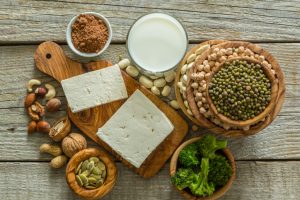
Protein
One of the main questions when it comes to vegan nutrition for fitness is ‘how do we get enough protein?’ Protein is an essential part of any diet for fitness. Without protein, we are unable to build or repair muscle, as this requires muscle protein synthesis (MPS). Protein can also aid with weight loss. Because it takes a large amount of energy to break down, it speeds up the metabolism. It also has an effect on hunger and satiety hormones, which curb your appetite (Leidy et al., 2015).
How Much Protein Do You Need?
The government RNI for protein is 0.75g per kilogram that you weigh (British Nutrition Foundation, n.d.). But for people who exercise, this can be greater. Nutritionist Martin McDonald advises at least 1.5g per kilogram for all of his clients, if not more. He explains to Real Voices (2014) that exercise involves muscle damage. Protein is required to support muscle repair and helps your body to adapt to your training.
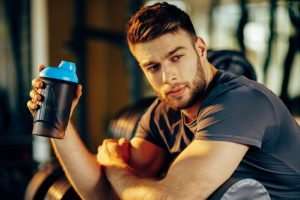
Essential Amino Acids
Sports nutritionist Emma McCrudden explains issues around protein when it comes to vegan nutrition for fitness. Only animal products contain all essential amino acids that make up ‘complete’ proteins. She explains that people tend to just remove these foods without getting adequate protein substitutes.
It’s more difficult for vegans to get all these essential amino acids. While many plant-based foods contain protein, they do not each contain every essential amino acid we need. But this doesn’t mean that a vegan diet needs to be deprived of complete proteins.
Variety and Amount of Protein for Vegans
McCrudden emphasises that proper vegan nutrition for fitness is achieved through blending a variety of different protein sources. This is because plant sources contain varying levels of key amino acids.
Consuming different sources of protein through the day is a great solution. For example, the amino acid lysine is absent in grains but present in legumes. While legumes don’t contain methionine, grains do. So, instead of just focusing on one vegan source of protein, variation is key. To ensure you are getting each of the essential amino acids required to maintain fitness, switch up your protein sources through the day.
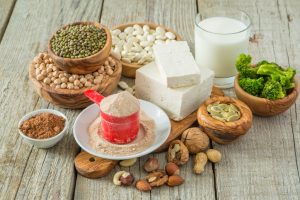
Because of the varying levels of amino acids, vegan nutrition for fitness involves a slightly higher protein intake. Because animal proteins have a higher amino acid content, they’re more potent for stimulating MPS. MPS drives muscle growth and repair. However, this can be compensated for by eating slightly more plant-based protein. One study found that consuming around 60g of wheat protein had similar effects to eating 35g of whey protein (Gorrissen, 2016).
Leucine
Of particular importance when it comes to MPS is leucine. Studies show that optimum leucine intake is around 8 grams per day (Volek, 2017). This amino acid is not present in high amounts in plant products. Because of this, McCrudden states that vegan nutrition for fitness often requires supplementation. McCrudden advises her vegan athletes to take a leucine supplement along with each meal.
Fat
To maintain good health, we need 0.5-1.5g fat per kilo of body weight per day (Pramukova et al., 2011). It is possible for a vegan to consume less fat than average. Vegetables, grains, and pulses are all very low in fat. This being said, many vegan foods such as avocado and nuts contain high amounts of healthy fats.
However, adequate intake of some fatty acids can be an issue – in particular, omega 3’s. Omega 3 fatty acids increase blood flow to muscles during exercise. They also help to reduce muscle soreness by up to 35%. Furthermore, they enhance the body’s sensitivity to insulin. This aids fat burning and reduces fat storage (Volek, n.d.).
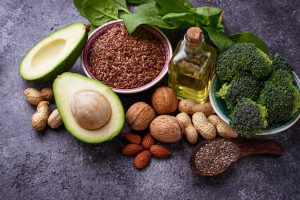
There are three types of omega-3 fatty acid. Firstly, ALA, which is derived from plants. But there are other two Omega-3s, EPA and DHA. These have the most potent health benefits. These are only found in animal products. And while the body can convert some ALA into EPA, it can only do so in small amounts (Lennon, 2019).
The easiest solution for this is supplementation. Most omega-3 supplements come in the form of fish oils. However, vegan versions are available. These are sourced from algae and are perfectly suited to vegan nutrition for fitness.
Summary
Vegan nutrition for fitness involves paying greater attention to protein intake. It is a similar case for omega 3 fatty acids. To ensure you’re optimising your vegan diet, vary your protein sources. Also, eat slightly more than an omnivore would. You might also want to consider supplementing with leucine.

While many vegan foods contain healthy fats, they lack in EPA and DHA. Supplements from algae are a great way to make sure you don’t miss out on the health benefits of these omega-3s.
In Vegan Nutrition for Fitness Part 2, we cover micronutrients and how to ensure you aren’t deficient. In the mean time, why not read our favourite pancake recipes? There’s a tasty vegan option you won’t want to miss out on!
